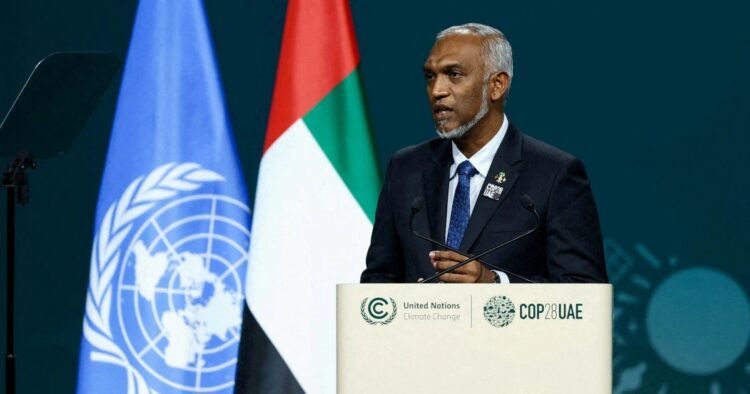The People’s National Congress (PNC), led by Maldives President Mohamed Muizzu, has emerged victorious in the recent parliamentary election held in the island nation. The PNC secured a remarkable two-thirds majority in the Maldivian parliament Majlis, winning 66 seats out of the 86 for which results have been announced.
This resounding victory paves the way for President Muizzu to consolidate power and pursue his policies with greater ease.
Maldives President’s Pro-China Stance Sparks Controversy Amid Religious Requirements for Citizenship
The victory of President Muizzu’s party in the Maldives elections has ignited a storm of controversy, particularly surrounding the President’s alignment with China and distancing from Bharat.
Critics argue that the President’s tilt towards Beijing, coupled with his Islamist background, signifies a departure from Bharat’s interests and values. Moreover, reports suggesting that being a Sunni Muslim is a prerequisite for Maldivian citizenship have raised concerns about religious freedom and inclusivity in the nation.
Bharat’s continued support for the Maldives, exemplified by its provision of food and medicines, stands in stark contrast to the struggles faced by its own citizens. This juxtaposition underscores Bharat’s commitment to international aid and solidarity, even as it grapples with domestic challenges.
People of #Maldives have given a landslide victory to Islamist President backing his tilt to China and away from India. Vishwaguru can keep giving them food and medicines while its own citizens struggle. Being a Sunni Muslim is a prerequisite to be a citizen of Maldives. pic.twitter.com/c5vjlbhWq6
— रवि | ravi 🍁 (@Ravi3pathi) April 22, 2024
The landslide victory of President Muizzu’s party has raised questions in New Delhi, particularly regarding the Maldives’ shifting stance towards China.
With a strengthened position in the parliament, President Muizzu is expected to accelerate his efforts to deepen economic cooperation with China, potentially sidelining Bharat in the process.
Importance of the Parliamentary Majority
The Majlis, Maldives’ legislative body, holds significant sway over the executive branch and can influence key policy decisions.
Prior to this election, the PNC was in the minority in the House, hindering President Muizzu’s ability to enact his agenda. However, with a commanding majority now secured, President Muizzu can push through policies without facing significant opposition from rival parties, the Maldivian Democratic Party (MDP), which has suffered a notable defeat in this election.
Relations with Bharat and China
President Muizzu’s victory marks a continuation of the Maldives’ pivot towards China, which began with his election to the presidency. Despite initial tensions, including calls to remove Bharatiya troops stationed in the Maldives, Muizzu has attempted to balance relations between Bharat and China.
While acknowledging Bharat’s support, he has also sought to expand ties with Beijing, emphasizing the importance of economic cooperation with China for the Maldives’ development.
The Maldives’ strategic location in the Indian Ocean makes it a key player in regional geopolitics, attracting the attention of major powers such as Bharat and China.
For China, expanding its influence in the Maldives aligns with its broader strategy of enhancing presence in the Indian Ocean region. Bharat, on the other hand, views the Maldives as a traditional ally and has sought to maintain close ties with the island nation.
President Muizzu’s party’s landslide victory in the Maldives parliamentary election signals a consolidation of power and a potential shift in the country’s foreign policy towards China.
While this outcome may raise concerns in Bharat, the evolving dynamics in the Indian Ocean region underscore the complexities of geopolitical competition in this strategically vital area. As President Muizzu assumes a stronger position domestically, his choices in foreign policy will likely have far-reaching implications for the region’s power dynamics.
As tensions simmer between the Maldives and Bharat, the implications for regional stability and diplomatic relations are profound. President Muizzu’s victory not only signals a shift in the Maldives’ foreign policy but also poses challenges for Bharat’s strategic interests in the Indian Ocean region.
Amidst these developments, the international community closely watches the evolving dynamics between these two nations, mindful of the broader implications for regional security and cooperation.

















Comments